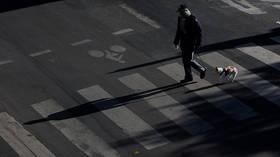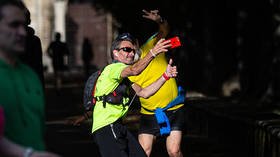‘I’m being treated like a leper’: Covid-19 survivors are shunned & abused by people who fear they’re still contagious

Coronavirus sufferers complain they are victims twice over: first from getting the disease, then by the way they are then stigmatized, as social safeguards mutate into their own contagious form of fear and loathing.
For Vince Pizzinga, 58, surviving three weeks locked in a room, flattened by Covid-19, fearing death and wrestling with the guilt of having passed on the virus to his wife, and his staff, was excruciating. Since he’s recovered, however, the garrulous and gregarious Sydney accountant has had to deal with being treated as though he’s wearing a Scarlet C by people who refuse to believe he’s no longer a danger.
“Honestly, I think I know now how people with HIV must have felt in the ’90s, not that I’m comparing, but you do feel like you’re being treated like a leper, because people around you are frightened of you, they think you’re contagious even though you’re not – I’ve had two clearances from my doctors,” Pizzinga explains.
“If I so much as cough, people freak out that I’ve got it again. I had one person who just jumped up and ran straight out of my office. I’ve never seen anything like it.”
Pizzinga had a boxing session with a personal trainer, who was coughing and seemed unwell, in late March, and started feeling weak himself a few days later. Testing soon confirmed both of them were Covid-19 positive and, after shuttering his business and sending his staff home (too late to stop several of them also contracting the virus), he locked himself in his bedroom.
“There were nine days when I had it and didn’t feel sick, and that’s the scary thing, that’s when you’re most contagious, and then my wife tested positive, too, but she never got sick at all, and I was suffering in that room, alone, for 21 days. I was breathless, I had night sweats and I’d get fatigued just walking to the bathroom, which is five steps,” Pizzinga recalls.
“My daughter, she’s 18, she was texting me from the other room, asking if I was okay, and I had to write back and tell her, ‘I’m worried I’m never going to see you again.’”
“It was depressing, I couldn’t see my wife or my daughters, and I was frightened, really terrified, that I was going to deteriorate, but I was also scared to go to the hospital, because I thought that would be it.”
The relief of coming out the other side was immediately tempered by the anger and fear that confronted him as he tried to return to society.
“There was a lot of blame, people saying you should have locked down earlier, you should have known, and I was angry at first, too, with my trainer, I blamed him, but he didn’t mean for this to happen,” Pizzinga says.
“And then I had people coming in saying, ‘why are you meeting with me?’ And I’m saying I’m allowed to work, my doctor has said I’m in the clear, but the way people look at you. Even some of my family, I started coughing and they’d run off, telling me I should go and get tested again.”
“People still think you’re contagious, people don’t believe you can’t give it to them, and it reminded me of this documentary I’d seen about HIV sufferers dealing with that same fear. It’s got to affect you mentally.”
“But I felt like I had to get back to work. I feel for my clients, some of them are really struggling, losing their business and losing their homes, it affects me emotionally, too. I’ve known these people for 30 years, and sometimes I feel like a psychologist for them. It’s exhausting.”
Also on rt.com Slavoj Zizek: Epidemics are like wars, they can drag on for YEARSDr. Richard Bryant, a professor of psychology at the University of New South Wales, says the stigma that people who have recovered from the disease are now facing is something common to previous pandemics.
“What we saw with SARS was that health workers, those on wards dealing with patients who were infected, faced all kinds of ostracism and even physical abuse, because people tend to be irrational about these things and to believe that these people are going to infect them, and being stigmatised like that can have a very detrimental effect on people’s mental health,” he explains.
“Having the virus is an accumulative stress for people, they’ve been sick, they’ve been isolated from their loved ones, and then on top of all that to have people shunning you really compounds that stress, the sense of being isolated just continues, and the longer that goes on, the worse the effects will be.”
“So much of the messaging has been about containing the virus, but we’re not getting much advice about what’s appropriate behaviour with people who’ve been cleared.”
“And as we head into winter and flu season here in Australia, a lot of people are going to find out what it’s like because, even though it’s illogical and it’s more likely just to be a common cold, every time someone sneezes or sniffles, someone else is going to look at them with great suspicion.”
Also on rt.com Banning hotel minibars, spraying bleach on beaches, dumping chicken manure on roads: Around the world in 80 madcap lockdown rulesIn the US, some sufferers are already raising the question of whether social safeguards are mutating into their own contagious form of fear and loathing.
The LA Times reported the case of J. Ollie Edmunds Jr, 79, who returned home from hospital in New Orleans after beating the virus, then had a fall and called the local fire department for help, but they refused to come to his aid because they knew his history. He had to wait six hours for paramedics.
“It felt like we had the scarlet letter ‘C’ on the house,” Anne Edmunds Aguirre, Joe’s daughter, explained.
“The general public still has that fear. Unless they trust you, they are going to be reluctant: ‘You had that virus, I don’t want to come.’”
Back in Australia, Pizzinga says he’s afraid of a second wave of the virus infecting him again. While some doctors have told him he’s now immune, “that I’m laughing, I’m lucky, I can start travelling again,” others have advised caution, pointing out that we just don’t know for sure whether surviving Covid-19 provides immunity, or if it does, for how long.
“Yesterday was the first day I’d been out for a walk along the beach, with my family, in six weeks, and it’s hard to explain just how good that was, because you don’t know how much you appreciate your health, just the simple joy of being able to go for a walk, until you feel like you’re going to lose it all.”
If you like this story, share it with a friend!
The statements, views and opinions expressed in this column are solely those of the author and do not necessarily represent those of RT.
















